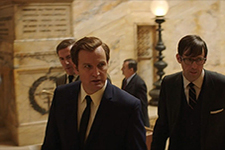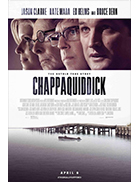Chappaquiddick
|  The so-called “Chappaquiddick Incident,” in which Massachusetts Senator Ted Kennedy, who at the time was 37 years old and the only surviving son of Kennedy patriarch Joseph Kennedy, drove a 1967 black Oldsmobile off the edge of a wooden bridge into a tide-swept pond on the small northeastern island of Chappaquiddick, resulting in the death of his passenger, Mary Jo Kopechne, has been the subject of at least 15 books and reams of newspaper and magazine articles and Internet debate. The incident was the subject of a judicial inquest, and Kennedy ended up pleading guilty to a charge of “leaving the scene of an accident causing bodily injury.” His two-month jail sentence was suspended, and he was never charged with manslaughter. The event did serious damage to his political career—even though he was re-elected to the Senate seven times by the people of Massachusetts, his Presidential aspirations were effectively dashed—and, according to some historians and biographers, it haunted him for the rest of his life. Depending on your perspective, this incident is either evidence of Ted Kennedy’s moral vacuity and the deep-seated corruption at the heart of Camelot, or it is simply a terrible tragedy that was eventually surmounted by one of the country’s longest serving and most effective politicans. John Curran’s new film Chappaquiddick falls somewhere in the middle of those two perspectives, which means it is unlikely to please anyone. Kennedy haters will think it is too soft, while Kennedy defenders will see it as character assassination. It is both and neither, as the screenplay by Taylor Allen and Andrew Logan makes it clear that Kennedy unnecessarily and for inexplicable reasons turned a terrible mistake into a fatal tragedy that his powerful father, despite being largely incapacitated by a major stroke, helped to cover up, while at the same time humanizing Kennedy by depicting him as the least-favorite son struggling in the formidable shadow of his brothers: Joe Jr., Jack, and Robert (just before the film’s title card, Ted is shown freezing up in an interview when asked when it’s like to live in JFK’s shadow). The film covers the day leading up to the incident, which took place late in the night of July 18, 1969, and the aftermath the unfolded over the following week, culminating with Kennedy delivering a live television address. Because so many of the events depicted are still in dispute and will never be resolved given that those involved are almost all deceased, the film is largely speculative in nature, which means that Allen and Logan have taken a significant deal of artistic license in dramatizing the event itself, which to this day remains fodder for conspiracy theories. Nevertheless, they and Curran do an admirable job of piecing together a great deal of conflicting information and re-enacting one possible scenario (ignore all the marketing slogans assuring us that we are finally seeing the truth of the untold story; nothing here is new and all has been hashed and rehashed hundreds of times over the years). Jason Clarke (Mudbound, Zero Dark Thirty), who does a deft job of morphing his Australian accent into a convincing Boston brogue, portrays Kennedy as a frustrated, largely sympathetic character who is uncomfortable in his own skin; he wears the power of the Kennedy family with only a moderate degree of confidence, and he knows all too well that he falls last in line in his father’s eyes and holds the position he does largely because he is the only one left standing, which turns the Chappaquiddick incident into not just any misfortune, but another addition to a literal dynasty of tragedies. His freezing up in the interview at the beginning of the film foreshadows his precarious position as the de facto head of that dynasty, and his clumsily steering his family’ boat into a buoy during the a regatta further underscores his inability to live up to the standards imposed on him. Mary Jo, the 28-year-old who died in the accident, was one of the “Boiler Room Girls,” the name given to the secretaries who worked so diligently on Robert Kennedy’s campaign before she was assassinated, an event that has shaken her to the point of driving her out of politics. Early scenes depict Ted trying to talk her into coming back to work on his own Presidential campaign, and the film steers clear of suggesting any sexual impropriety between them (Kennedy’s wife was pregnant and bed-ridden at the time, while Mary Jo was single). The film does not, however, imply that Kennedy was not largely responsible for her death: Not only does it depit him as being drunk when he went off the bridge (something he adamantly denied), but it also suggests that he made no effort to save her and that she died not of drowning, but rather of suffocation, as the small air bubble that formed in the car (which landed in the pond upside down) was eventually depleted of oxygen, the horrific implication being that, had Kennedy tried to get help rather waiting until the next morning to report the incident, she would have lived. The film depicts Kennedy’s cousin, Joseph Gargan (Ed Helms), a lawyer and fixer of sorts for the family who sounds the film’s moral voice, and their friend Paul Markham (Jim Gaffigan), a former Massachusetts prosecutor, begging Kennedy to report the incident that night, thus further implicating him in her unnecessary death. Some questions, such as how Kennedy got out of the car while she couldn’t, are left unanswered. As a whole, Chappaquiddick works quite well, and it wouldn’t be entirely out of line to see it, like Steven Spielberg’s The Post (2017), as a recreation of recent history as cautionary tale about the road leading to our current world of political debasement. Curran, who previously directed the Australian adventure tale Tracks (2013) and the W. Somerset Maugham adaptation The Painted Veil (2006), treads a find line in avoiding outwardly defending or convicting Ted Kennedy; in a way, he does both, which turns the film into a slow-burn depiction of an imminent collision course between political power and personal responsibility. Copyright © 2017 James Kendrick Thoughts? E-mail James Kendrick All images copyright © Entertainment Studios Motion Pictures |
Overall Rating: 

 (3)
(3)


